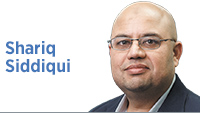Subscriber Benefit
As a subscriber you can listen to articles at work, in the car, or while you work out. Subscribe Now A warm winter in Indiana, snow in Saudi Arabia and hurricanes on our coasts indicate increasingly changing patterns of climate. Over the last year, we have seen devastating floods in Pakistan and Bangladesh, earthquakes in Turkey and similar disasters in the United States.
A warm winter in Indiana, snow in Saudi Arabia and hurricanes on our coasts indicate increasingly changing patterns of climate. Over the last year, we have seen devastating floods in Pakistan and Bangladesh, earthquakes in Turkey and similar disasters in the United States.
Over time, fewer people have denied the reality of climate change and its clear connection with human activity and behavior. The debate has changed from arguing that climate change is not connected to human behavior to what is a reasonable economic cost to pay today for devastating consequences in the future.
Economics, science, public policy and freedom have been central to this debate. However, activists, policymakers and scientists have long undermined one of the most powerful forces for environmental resilience: religious values.
Muslims account for nearly a quarter of the world’s population, much of which is vulnerable to climate change. For instance, the Middle Eastern and North African regions have arid or semiarid climate, making the region vulnerable to extreme heat and water insecurity. Additionally, Muslim-majority countries in Asia such as Pakistan, Bangladesh and Indonesia have also faced extreme weather events and flooding.
Therefore, it is important for Muslims to be at the forefront of the climate discourse. It is also important to incorporate Islamic worldviews and frameworks into finding solutions to climate change and building environmental resilience. This year’s United Nations Climate Change Conference, or COP28, was held in a Muslim-majority country, United Arab Emirates.
Yet, even within this setting, a long history of Islamic discourse on the environment was largely ignored. For example, Iranian-born Muslim philosopher Seyyed Hossein Nasr’s view on the interlink between environmental degradation and the spiritual and moral crisis of the modern world drawn from Sufism and the concept of the unity of universe should have been highlighted at the conference.
The conference should have also echoed the more recent literature on Islamic environmentalism that does not refer to sectarian boundaries but rather tends to highlight the unifying function of environmentalism. Engaged Muslims from different branches of Islam can identify with environmentalism, thereby creating an imagined community that struggles for a joint environmental cause. Muslim environmentalists draw upon Islamic religious texts to generate environmental principles from them, thereby creating ecological interpretations of Islam and a set of Islamic environmental ethics.
Although different authors tend to name different principles, the main ones scholars usually refer to are Tawhid (unity of creation, including humans and nature) and Khalifa (human beings as stewards of all of God’s creations). Their role within Islamic environmentalism is interrelated with other important principles: Mizan (harmony of all parts of creation) and Maslahah (the public interest in caring for future generations).
Embedded within religion are powerful ideas that can shape not only our values but also our actions. A discourse on environmental resilience that embraces religion as a positive force for good in society is a critical step to engaging a larger group of humanity.
Religious traditions have been successful at calling its adherents to self-sacrifice. Think about fasting during Ramadan or Lent; charity or philanthropy are all forms of self-sacrifice that lead to greater good for oneself. Arguably, religion can help humans make difficult but necessary choices that economics and science alone cannot.
To ensure environmental resilience, we need to embrace religion as a critical partner for success. Within each religious tradition is a powerful (and broad) definition of philanthropy that can unlock multiple tools and the ability of billions of people in our fight to preserve our environment for future generations.•
__________
Siddiqui is assistant professor and director of the Muslim Philanthropy Initiative at the Lilly Family School of Philanthropy at Indiana University. Send comments to [email protected].
Click here for more Forefront columns.
Please enable JavaScript to view this content.
